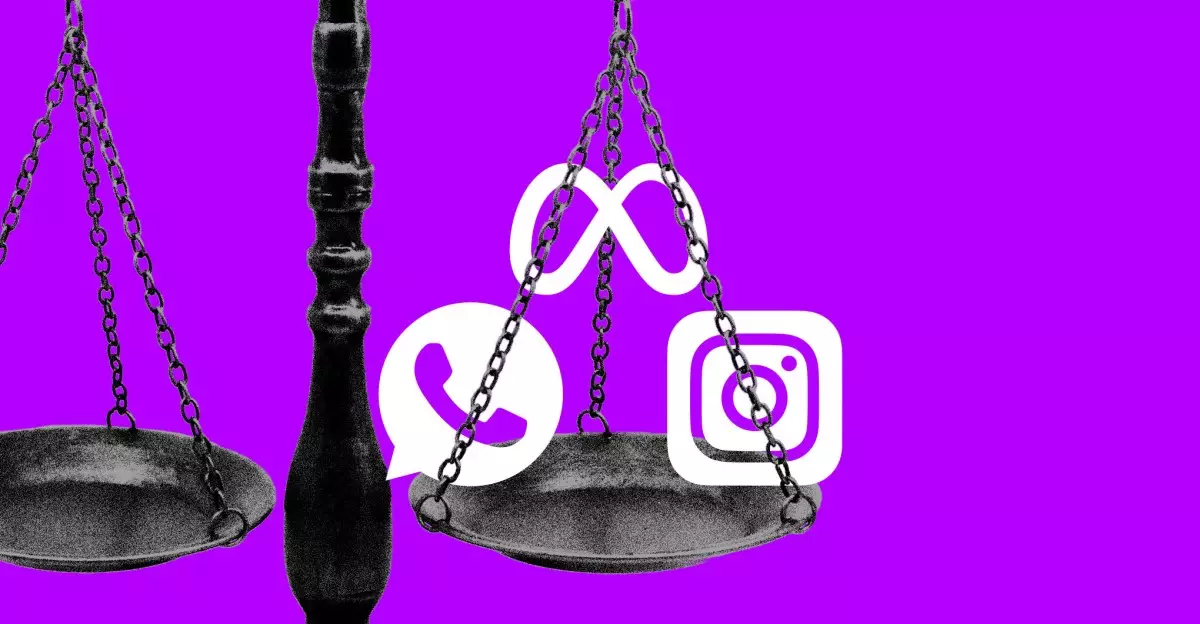In a legal showdown that has captured headlines and ignited discussions on market monopoly, the trial of the Federal Trade Commission (FTC) against Meta Platforms, Inc. reveals the complexities and controversies surrounding the tech titan’s acquisition strategy. At its heart lies not just a battle over antitrust accusations, but a deeper inquiry into the evolutionary trajectory of social media and online communication. Mark Zuckerberg, CEO of Meta, found himself in the courtroom, where he contended against the government’s assertion that he purposefully acquired WhatsApp and Instagram not to enhance their capabilities, but to eradicate them as competitors.
As the trial unfolds, Zuckerberg’s approach—steering Meta through a rapidly evolving digital ecosystem—merits scrutiny. The jury isn’t merely judging whether Meta’s acquisitions are monopolistic; they are grappling with pivotal questions surrounding innovation, competition, and the very essence of what makes a tech company thrive in the contemporary landscape.
Zuckerberg’s Confidence in His Vision
Throughout an intense three-day testimony, a notable moment emerged when Meta’s lead attorney, Mark Hansen, prompted Zuckerberg about spending $19 billion on WhatsApp in 2014. Remarkably, Zuckerberg’s response—”I’d do it again”—evoked more than just confidence; it revealed a strategic mindset focused on the future rather than past expenditures. Underpinning his perspective is a broader recognition of the shifting patterns of user engagement and communication.
In a world where interactions are increasingly private and ephemeral, Zuckerberg viewed WhatsApp’s burgeoning user base as a transformative opportunity. He articulated his belief that the app would navigate users away from public feeds and instead foster personal dialogues. This willingness to invest in a technology that bridged a significant gap in communication reflects an astute understanding of social dynamics. It was not merely about acquiring competitors; it was an embrace of innovation and adaptation that has since carved Meta into a formidable player on the global stage.
WhatsApp: A Tactical Acquisition
During the trial, Zuckerberg painted a picture of WhatsApp that diverged from the government’s narrative. The FTC presumed the acquisition stemmed from fear of competition; however, Zuckerberg emphasized the app’s limitations and the founders’ evident aversion to the social media sphere. In his recounting, the fears concerning WhatsApp’s disruptive potential seemed unfounded—where Zuckerberg saw underwhelming ambitions, the FTC saw a cataclysmic threat. His assertion that the founders lacked an appetite for growth challenged the perception of a strategic kill; rather, this was a calculated risk grounded in acquiring potential rather than quelling a competitor.
Indeed, Zuckerberg’s testimony showcased a level of self-awareness. He admitted uncertainty regarding how much leverage the acquisition would grant in negotiations with giants like Apple and Google. This honesty not only humanizes Zuckerberg but also provides insight into the mindset of a leader making high-stakes calls amid a shifting landscape. His reflections underscore the intricate relationship tech companies have with distribution channels, turning the courtroom into a stage for examining the nuanced dynamics at play in the realm of digital competition.
Instagram: Collaboration or Competition?
Parallel to the dialogue surrounding WhatsApp, the narrative with Instagram illustrates a different facet of Zuckerberg’s strategy. Initially, the acquisition raised eyebrows, compelling critics to argue that Zuckerberg intended to nullify a potential competitor. Yet, Zuckerberg’s account painted a different portrayal—an investment in a platform that he’d scarcely considered a threat until it amassed a substantial user base.
This reactionary sentiment, born from a growing concern over Instagram’s skyrocketing popularity, reflects a broader theme within tech ecosystems: the constant balancing act between fostering creativity and stifling competition. While it may be easy to dismiss Zuckerberg’s motivations as purely defensive, his assertion that Instagram thrived thanks to Meta’s resources invites further consideration. He provided essential support that elevated the application from a modest startup to a global powerhouse, challenging the view that acquisition inherently stifles competition.
The courtroom drama highlighted internal communications illustrating Zuckerberg’s strategic shifts post-acquisition. His instinct to reduce Facebook’s engagement-driven tactics with Instagram showcases the industry’s ever-evolving narrative; here, collaboration emerged instead of outright suppression. Such decisions demonstrate his belief that mergers could, in fact, cultivate organic evolution rather than stifle it.
The Ripple Effects of Leadership Decisions
Ultimately, Zuckerberg’s testimony reads as a case study in leadership—a juxtaposition of ambition, foresight, and adaptation. The unfolding trial is not merely about defending acquisitions against legal challenges but also serves as a lens through which we can evaluate how leaders navigate an intricate mix of competition and collaboration. Tech giants like Meta are enduring subjects for scrutiny in a landscape revisiting the ethics of growth and the fragility of innovation.
As the debate rages onward, Zuckerberg’s reflections resonate with anyone following the ever-fractured tech world, symbolizing the often unseen complexities in making monumental business decisions. Whether the court rules in favor of the FTC or Meta, the implications of this case will echo throughout the technology industry for years to come, reshaping the narrative of what it means to innovate and dominate in a crowded digital marketplace.


Leave a Reply